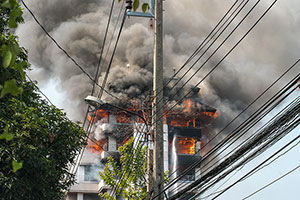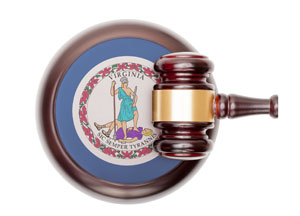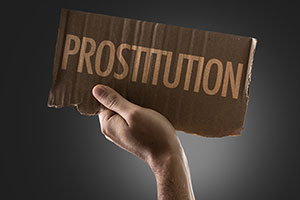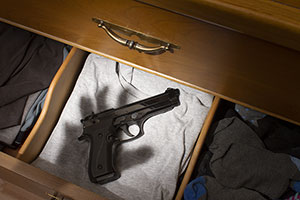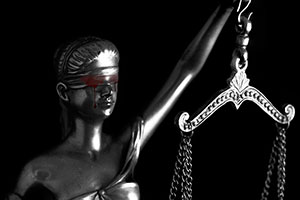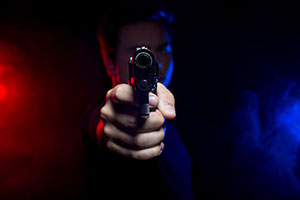A defendant who is charged with aggravated arson in Ohio wants to call a fire expert to support his theory of how the fire started. The prosecution filed a Daubert motion that challenged the expert’s qualifications to testify and his methodology. The trial court has not yet indicated how it will rule.
Facts of the Case
A fire in Middleport, Ohio destroyed two businesses in May 2016. The fire occurred at night, after the stores were closed. Apartments on the second floor of the two buildings were unoccupied and no lives were lost.
The state fire marshal determined that the fire was suspicious. Reports at the time of the fire suggested that someone started it by lighting a gas can and flinging it into one of the buildings or into an alley behind the buildings.
The Major Crimes Task Force received a tip that the fire was started intentionally. Police arrested Keith Day after questioning witnesses at the scene. A grand jury later returned an indictment for two counts of arson.
Witnesses apparently told the police that Day made threatening statements after being kicked out of a tavern and that the tavern may have been the actual target of the fire.
Qualifications of Defense Expert
Ohio is essentially a Daubert state, although the state’s judicial decisions suggest that Ohio judges may have more flexibility than federal judges in determining the reliability of expert testimony. Judges are nevertheless required to determine whether an expert’s opinion meets a threshold standard of reliability. If it does not, the judge must exclude the testimony.
The prosecution challenged the qualifications of the defense expert. Ohio follows the general rule that an expert witness is qualified to testify when the expert has scientific, technical, or other specialized nature that is beyond the knowledge or experience of lay persons.
The prosecution apparently agrees that the defense expert, Dr. David Manuta, was a qualified expert in the past. Dr. Manuta has a Ph.D. in chemistry and has given expert testimony in trials or depositions in dozens of civil and criminal cases.
The prosecution argues, however, that Dr. Manuta is no longer “up to speed” and is therefore not qualified to testify as an expert. That argument is based in part on the fact that Dr. Manuta has not published any recent articles in his field of expertise. Publication, however, has never been seen as a requirement that determines whether an expert is qualified to testify.
The prosecution also made the following argument based on Dr. Manuta’s testimony at a Daubert hearing. According to the prosecutor:
Dr. Manuta was not able to recall fundamental rules from the National Fire Protection Association (NFPA). NFPA is the “standard” for such science according to Dr. Manuta. Yet, on cross examination he said there was not a level of certainty or even varying levels of certainty as outlined in the NFPA Manual. Level(s) of certainty are crucial to a scientific expert testifying. It wasn’t until the state’s attorney handed him a copy to review that he realized the different levels.
Failing to recall a specific detail in a manual may affect the credibility of an expert’s testimony at trial, but no witness has perfect recall. The prosecutor can use Dr. Manuta’s failure of recollection to challenge his credibility at trial, but Ohio law makes clear that the jury, not the judge, should decide whether an expert is credible.
It seems unlikely that an Ohio judge would disallow an expert’s testimony because his recollection of details was faulty during a Daubert hearing. This case nevertheless illustrates the importance of preparation. If experts rely on professional or scientific standards, they should review those standards carefully before testifying.
Bias
The prosecution argued that Dr. Manuta is biased because he “testified that he was hired by Defense Counsel to help Defendant, paid to help Defendant, and started the scientific method with the idea to help Defendant.” Of course, all expert witnesses are hired and paid in the hope that they will provide helpful testimony to the party that hired them.
An expert’s search for the truth is not inconsistent with an attempt to determine whether the truth will assist the party who hired the expert. In the absence of evidence that Dr. Manuta slanted his conclusions to favor the defense, the question of bias is one that the jury can consider as it evaluates Dr. Manuta’s testimony. The prosecutor’s assertions of bias should not prevent the expert from testifying.
Methodology
The prosecution’s final argument is that Dr. Manuta did not conduct any experiments to verify his hypothesis as to how the fire started. Yet expert opinions can be based on a review of existing data, and if that data is sufficient to support the expert’s theory, there may be no need to conduct independent experiments.
Press accounts are a bit murky as to the data that Dr. Manuta relied upon and the conclusions he drew from that data. Still, the judge will likely reject this challenge unless there is a clear showing that Dr. Manuta’s theory as to the fire’s origin could only be deemed reliable if it is supported by experimental results.


